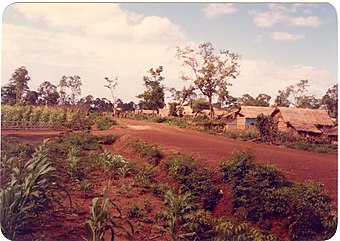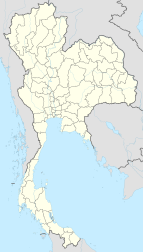Rithysen
|
Nong Samet Chumrum Thmei Rithysen or Rithisen |
|
|---|---|
| Refugee camp | |

Nong Samet Camp, section 2, May 1984.
|
|
| Nickname(s): 007 | |
| Coordinates: 13°49′55″N 102°44′00″E / 13.83194°N 102.73333°ECoordinates: 13°49′55″N 102°44′00″E / 13.83194°N 102.73333°E | |
| Country |
|
| Established by Cambodian refugees | May 1979 |
| Moved on the orders of the Royal Thai Government | May 1980 |
| Relocated by UNBRO and the Royal Thai Government | January 1983; December 1984 |
| Government | |
| • Type | Guerrilla Organizations: Khmer Angkor, KPNLF |
| • Military Commander | Long Rithia (May–December 1979) |
| • Military Commander | In-Sakhan (December 1979-July 1980) |
| • Military Commander | Om Luot (July 1980-October 1982) |
| • Civilian Administrator | Thou Thon (1980-1993) |
| Area | |
| • Total | 2.1 km2 (0.8 sq mi) |
| Population (January 1984) | |
| • Total | 45,000 to 70,000 |
| • Density | 27,000/km2 (70,000/sq mi) |
Nong Samet Refugee Camp (Thai: ค่ายผู้อพยพหนองเสม็ด, also known as 007, Rithisen or Rithysen), located in Nong Samet Village, Khok Sung District, Sa Kaeo Province, Thailand, was one of the largest refugee camps on the Thai-Cambodian border and served as a power base for the Khmer People's National Liberation Front (KPNLF) until its destruction by the Vietnamese military in late 1984.
Refugees began entering Thailand in large numbers after Vietnam invaded Kampuchea in December 1978 and forced the Khmer Rouge out of power. A refugee settlement was established near the Thai village of Ban Nong Samet sometime in May 1979, and received its first shipment of food aid on October 11.
The camp was originally referred to as Chumrum Thmei (New Camp) to distinguish it from its neighbor and rival Mak Mun Camp, which was also known as Chumrum Chas (Old Camp). Nong Samet was later renamed 007 "because of its many intrigues" and in August 1980 was christened Rithysen, after a Khmer folk hero "who survived when his brothers and sisters were devoured through the machinations of a cannibal ogress, and who then tricked the ogress’ daughter."
Nong Samet Refugee Camp was located originally just inside the Thai border, about one kilometer northeast of Mak Mun and two kilometers northeast of Nong Chan. Almost immediately all three camps were dominated by autonomous warlords who, with several hundred undisciplined and badly-equipped guerrillas, controlled commercial activities and managed food distribution to the civilian population.
...
Wikipedia

